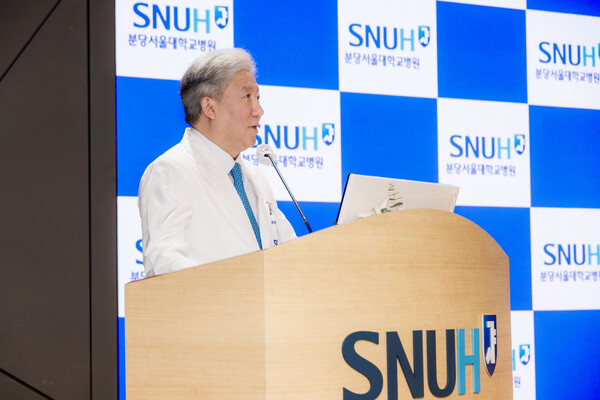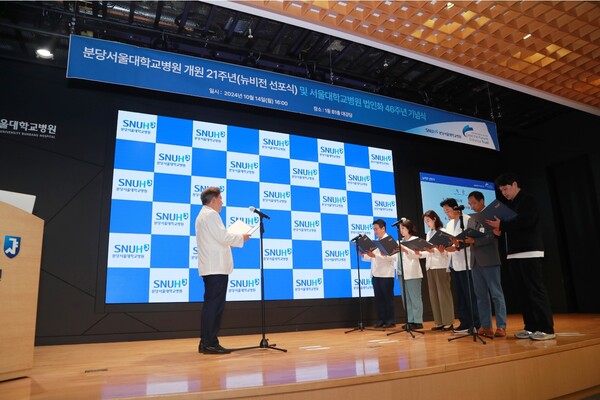On its 21st anniversary on Monday, Seoul National University Bundang Hospital (SNUBH) announced a new vision focused on advancing the future of healthcare. The initiative, titled "Lead the Future, Enhance Trust," reflects a commitment to transformation. More than 300 faculty and staff gathered in the hospital’s auditorium in Seongnam, Gyeonggi Province, to hear President Song Jung-han reveal what this change means for one of Korea’s major medical institutions.
During the ceremony, representatives from various departments—including physicians, nurses, and pharmacists—made a collective pledge. They vowed to move beyond conventional practices, broaden the scope of medical research, and embrace the kind of innovations that could redefine patient care. The goal, as described by the hospital, is to “build a deeper trust not only with patients but within the institution itself” as it seeks to set a global standard for medical excellence.

Since adopting its previous vision in 2013, titled "A people's hospital leading the world's medical standards," SNUBH has emerged as a key player in the international medical community. Renowned for its advancements in minimally invasive surgeries, the hospital has attracted professionals worldwide eager to learn from its patient-centered approaches.
In 2010, SNUBH became the first hospital in Europe and Asia to achieve HIMSS Stage 7 certification, a prestigious recognition awarded by the Healthcare Information and Management Systems Society, a leading global medical IT organization. This certification assesses the level of digitization in healthcare institutions, with Stage 7 being the highest designation. SNUBH received this accolade for its proprietary electronic medical record (EMR) system, BESTCare 2.0, building on the earlier version, BESTCare 1.0.
The hospital has since exported its medical information system to the U.S., Middle East, and Japan. "This wasn’t just a milestone for us,” a hospital spokesperson noted. “It demonstrated that a Korean-developed system could compete and lead in global markets.”
SNUBH's new vision, described as “the people’s hospital, opening the horizon of a healthy future,” aims to go beyond previous accomplishments. The initiative seeks to reshape healthcare as the hospital extends its global influence, focusing on five pillars: advancing medicine, fostering education, driving biohealth research, prioritizing public health, and enhancing its internal culture under the slogan “Snubian Together.”
Song said, “We've spent the last decade setting the bar, but now it's time to break new ground. The future of healthcare demands more as we face an aging population and increasing demands for essential services.”
Since expanding to 1,300 beds in 2013, SNUBH has solidified its position among Korea’s top five hospitals, just a decade after its establishment. Its surgical teams have set the pace, performing the world’s first 1,000 laparoscopic liver resections between 2003 and 2016 and leading advancements in minimally invasive gastric cancer surgery.

Surgeons from the U.S., U.K., France, Italy, and Germany have traveled to SNUBH to learn its advanced techniques in laparoscopic liver resection. The hospital has also initiated a telemedicine program to instruct physicians across Asia in laparoscopic surgery. Additionally, SNUBH has become a training hub for precision techniques like microvascular cerebral anastomosis, attracting professionals from across the Asia-Pacific region seeking to refine their skills.
Milestones kept piling up. The hospital was the first in the world to complete 500 laparoscopic gastric cancer surgeries, demonstrating that minimally invasive methods weren’t just possible—they were safe and effective. By 2016, SNUBH had performed 1,000 robotic surgeries for kidney cancer and led the way in Korea with the first single-port laparoscopic surgeries for gastric cancer, ranking second globally.
Since its establishment, SNUBH has marked several significant achievements in surgical history, including the first laparoscopic surgery on the liver's left lateral segment, Korea’s first laparoscopic pancreatic tumor surgery, and the first endoscopic esophageal cancer surgery. Recently, the hospital celebrated its 10,000th gastric cancer surgery and performed the world’s first robotic thyroidectomy on a five-year-old child.
“Our spirit of innovation has led to numerous milestones, positioning SNUBH as a leader in minimally invasive cancer surgeries and contributing to improved patient quality of life,” the hospital spokesperson said.
In 2016, SNUBH launched the Healthcare Innovation Park, a research hub designed to connect industries, universities, and hospitals. According to the hospital, this center represents the hospital’s forward-thinking vision by shifting from traditional patient treatment to exploring the potential of the healthcare convergence industry, which includes biomedicine, medical devices, and healthcare information and communication technology (ICT).
“Startups often struggle to connect with physicians, but Healthcare Innovation Park changes that. It promotes early collaboration, supporting the entire healthcare research and development cycle—from idea generation to clinical research and commercialization,” the SNUBH spokesperson explained. By integrating the hospital with pharmaceutical companies and research institutes, SNUBH is creating a biomedical cluster model strategically located near the tech hubs of Pangyo and Gwanggyo, as well as a dense network of medical device firms in Seongnam.
By 2022, SNUBH was designated as a Metropolitan Infectious Disease Specialty Hospital and is now developing Korea’s largest infectious disease facility, which will serve Seoul, Gyeonggi, Incheon, and Gangwon with 342 beds.
Related articles
- Frequent weight fluctuations linked to increased risk of early-onset dementia: SNUBH study
- SNUBH publishes review on autoimmune-induced neurological syndromes in international journal
- SNUBH partners with Greater Sacramento Economic Council for biotech collaboration
- SNUBH opens 1st pediatric ICU in Gyeonggi Province
- Seoul National University Bundang Hospital Consortium to construct general hospital in Uzbekistan
- SNUBH doctor wins Best Poster Award at AFSUMB 2024 for breast cancer screening study
- Omega-3 enhances executive function in adults aged 40 and older: meta-analysis
- SNUBH study reveals gender-specific genetic factors of autism among Koreans
- Integrated rehabilitation shows effectiveness in treating hip fractures
- [Interview] 'Goryeo saram' doctor in Korea advances global patient care at SNUBH International Healthcare Center
- Articulated laparoscopic instruments improve surgical outcomes in colorectal surgery: SNUBH study
- SNUBH aims to become a research hub for advanced biopharmaceuticals
- Professor Son joins HIMSS board as 1st Korean member

